12 Best AI Tools for Small Business to Boost Growth in 2026
Discover the 12 best AI tools for small business in 2025. Our guide covers features, pros, cons & pricing to help you automate and grow.

Navigating the crowded market of AI solutions can feel overwhelming, especially for small and medium-sized businesses (SMBs) trying to gain a competitive edge. The challenge isn't just finding a tool; it's finding the right tool that integrates seamlessly, solves a specific problem, and delivers a clear return on investment. Many business owners struggle to differentiate between genuine, impactful solutions and overhyped platforms that fail to deliver. This guide cuts through the noise to help you discover the best ai tools for small business operations.
We've compiled a comprehensive list of platforms and marketplaces designed to help you discover, compare, and implement AI technologies effectively. Instead of generic descriptions, you'll find a detailed analysis of what makes each resource valuable, from specialized AI marketplaces to business software suites with powerful, integrated AI features. We focus on practical applications, helping you understand how these tools can streamline marketing, enhance customer service, and automate tedious operational tasks. For instance, knowing how to leverage AI for SEO can dramatically improve your online presence, and the right tools make that process accessible.
This article provides the clarity needed to make informed decisions. Each entry includes direct links and screenshots to give you a clear view of the user experience before you commit. Whether you need a simple chatbot, an advanced analytics platform, or guidance on a broader AI co creation strategy, this resource is your starting point. Our goal is to equip you with the knowledge to select and implement solutions that drive real growth and efficiency for your business.
1. Ekipa AI: For Strategic AI Implementation
While many platforms offer off-the-shelf AI tools, Ekipa AI distinguishes itself by prioritizing strategy before implementation. It functions less as a single tool and more as a comprehensive AI co creation partner, guiding small to mid-sized businesses from initial ideation to a fully operational, production-ready solution. This strategic-first approach is crucial for businesses that understand the need for AI but lack a clear vision of where to begin or how to generate a tangible return on investment.
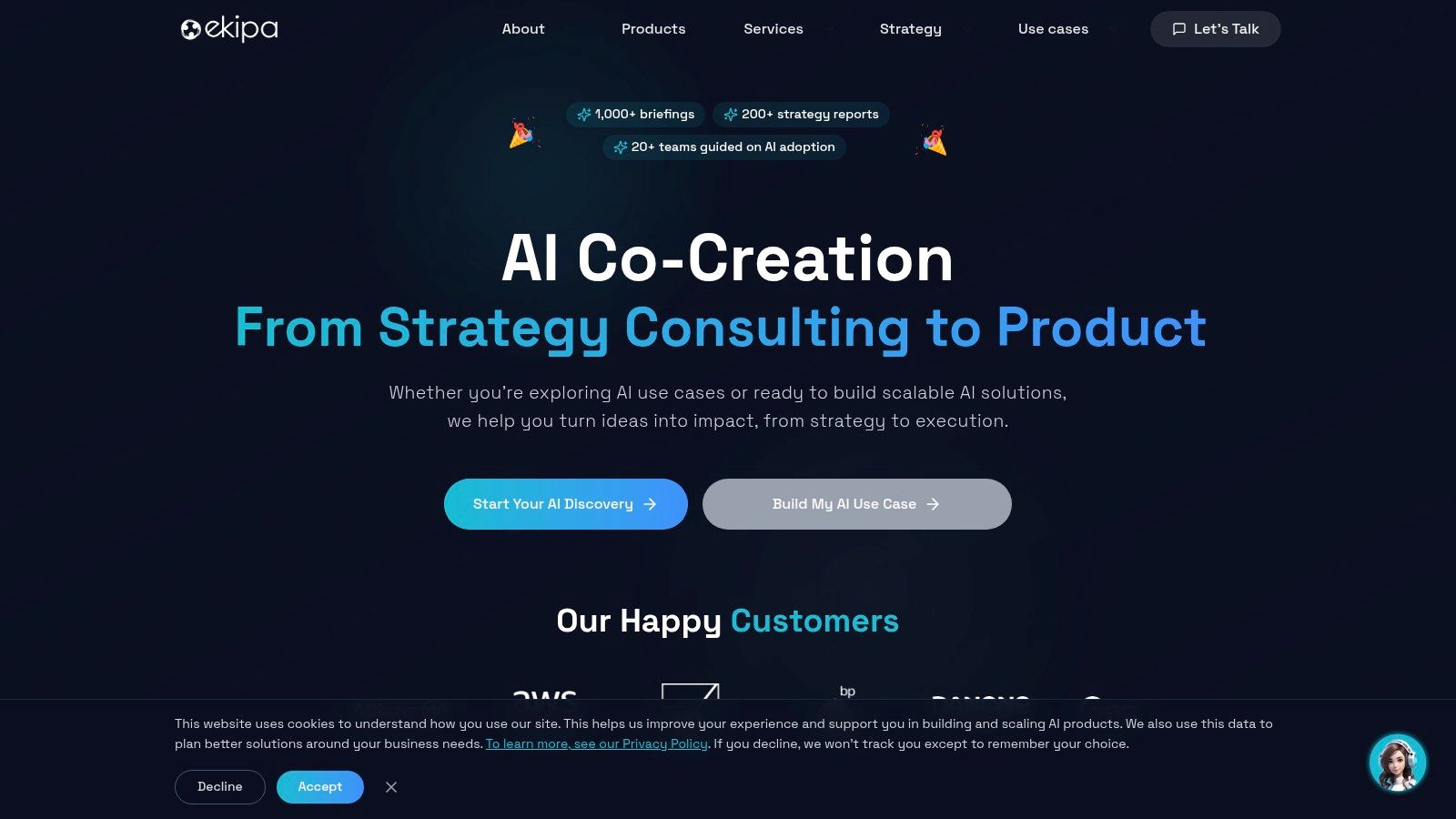
Ekipa AI's standout feature is its ability to deliver a Custom AI Strategy report within 24 hours. This rapid diagnostic provides a tailored roadmap, identifying high-impact opportunities specific to your business and industry. This service effectively demystifies the AI adoption process, providing a concrete action plan instead of overwhelming you with technical jargon. Their end-to-end support model ensures that the strategy translates into a successful deployment, making it one of the best AI tools for small business leaders seeking a guided, results-oriented journey.
Key Features and Practical Use Cases
Ekipa AI's model is built on a foundation of expert-led collaboration. Their process includes workshops and team enablement sessions designed to build internal AI capabilities, ensuring long-term success rather than a one-off project. For instance, a small retail business could use Ekipa's AI strategy consulting to identify that an AI-powered inventory management system would yield the highest ROI. Ekipa would then guide them through the entire AI Product Development Workflow, from initial requirements to final implementation.
Why It's a Top Choice: Ekipa AI bridges the critical gap between recognizing the potential of AI and successfully integrating it into business operations. Its focus on a bespoke strategy ensures that resources are invested in solutions that deliver measurable business value.
Pros and Cons
| Strengths | Limitations |
|---|---|
| Rapid Strategy: Delivers a tailored AI roadmap within 24 hours, accelerating decision-making. | Target Audience: Primarily focused on mid-sized enterprises, not micro-businesses. |
| End-to-End Support: Comprehensive guidance from use case discovery to production. | Opaque Pricing: Custom quotes are required, as pricing is not listed publicly. |
| Expert-Led: Backed by a team of AI specialists and agile experts ensuring high-quality, innovative solutions. | |
| Free Resources: Offers valuable, industry-specific AI strategy reports to help inform your initial decisions. | |
| Team Enablement: Includes personalized workshops and coaching to boost internal AI adoption and skill development. |
Getting Started
To begin, you can request a free, industry-specific strategy report directly from their website. This provides an immediate, no-commitment glimpse into potential AI applications for your sector and a taste of their strategic approach. For a more personalized plan, engaging with their consultation process is the next step to unlocking a tailored AI transformation.
2. G2
G2 isn't an AI tool itself but rather an indispensable starting point for discovering them. As the largest B2B software marketplace, it offers an exhaustive library of peer-reviewed software, making it a crucial research platform for any small business looking to find the best AI tools for small business. Instead of relying on marketing claims, G2 provides access to unfiltered feedback from real users, which is invaluable when assessing how a tool performs in a real-world business environment.
The platform excels at helping you quickly shortlist potential solutions. You can filter by company size, user satisfaction scores, and specific features. This level of granular control ensures you're only looking at tools that are genuinely a good fit for your operational scale and budget.
Why It’s a Go-To Resource
G2’s strength lies in its verified user reviews and comprehensive comparison grids. You can place two or three AI marketing automation tools side-by-side and directly compare their features, pricing tiers, and user ratings on key aspects like "Ease of Use" and "Quality of Support." This direct comparison accelerates the decision-making process significantly.
G2's "Best Software for Small Business" and "Best AI Software" lists are particularly useful, as they are curated based on thousands of data points, saving you hours of manual research.
Practical Tips for Using G2
To get the most out of the platform, look beyond the overall star rating. Dive into the detailed reviews and filter for feedback from companies of a similar size to yours. Also, be mindful that sponsored listings can appear at the top of category pages, so scroll down to see the organic, grid-based rankings for a more balanced view. Using G2 effectively is a key first step before committing to an AI requirements analysis.
-
Pros: Extensive real-user feedback and broad category coverage. Up-to-date rankings specifically for small business needs.
-
Cons: Sponsored placements can influence visibility. Highly competitive categories require careful vetting to find niche solutions.
-
Access: The platform is free to use for browsing and research.
-
Website: https://www.g2.com
3. Capterra
Similar to G2, Capterra is a comprehensive software review and comparison platform, not a direct AI tool. It serves as a vital research hub for decision-makers, offering a dedicated directory for Artificial Intelligence software that is particularly useful when searching for the best AI tools for small business. Capterra simplifies the discovery process by allowing businesses to compare software based on features, pricing models, and authentic user feedback.
The platform is designed to help small businesses navigate the crowded software market efficiently. Its powerful filtering system lets you narrow down options based on business size, specific functionalities, and deployment type, ensuring the results are relevant to your unique operational needs and budget constraints.
Why It’s a Go-To Resource
Capterra's main advantage is its human-moderated review process, which helps ensure the authenticity and reliability of user feedback. The platform also provides clear labeling for sponsored content, offering a transparent view of which vendors are paying for visibility. Its comparison tools are intuitive, allowing you to evaluate multiple AI solutions simultaneously against key criteria.
Capterra often features infographics and "Top 20" reports for various software categories, which provide a quick, data-driven overview of the leading tools based on user reviews and web search interest.
Practical Tips for Using Capterra
For the best results, leverage the filters for business size to see reviews from peers in a similar situation. Look beyond the star ratings and read the detailed pros and cons in individual reviews to understand potential pain points. While sponsored listings are clearly marked, always scroll down to the organic results to get a complete picture of the market before beginning an AI requirements analysis.
-
Pros: Strong filtering capabilities tailored for small businesses. Human-moderated reviews provide a high level of trust.
-
Cons: Sponsored listings are positioned at the top of search results by default, which can influence initial impressions.
-
Access: The platform is free for research and browsing.
-
Website: https://www.capterra.com
4. AppSumo
While not a single tool, AppSumo is a vital marketplace for any small business seeking cost-effective AI solutions. It’s a deal site that offers lifetime and heavily discounted deals on emerging SaaS products, many of which are AI-powered. For budget-conscious businesses, this platform provides an affordable gateway to experiment with the best AI tools for small business without committing to expensive monthly subscriptions. It’s the perfect place to discover innovative marketing, automation, and content creation tools.
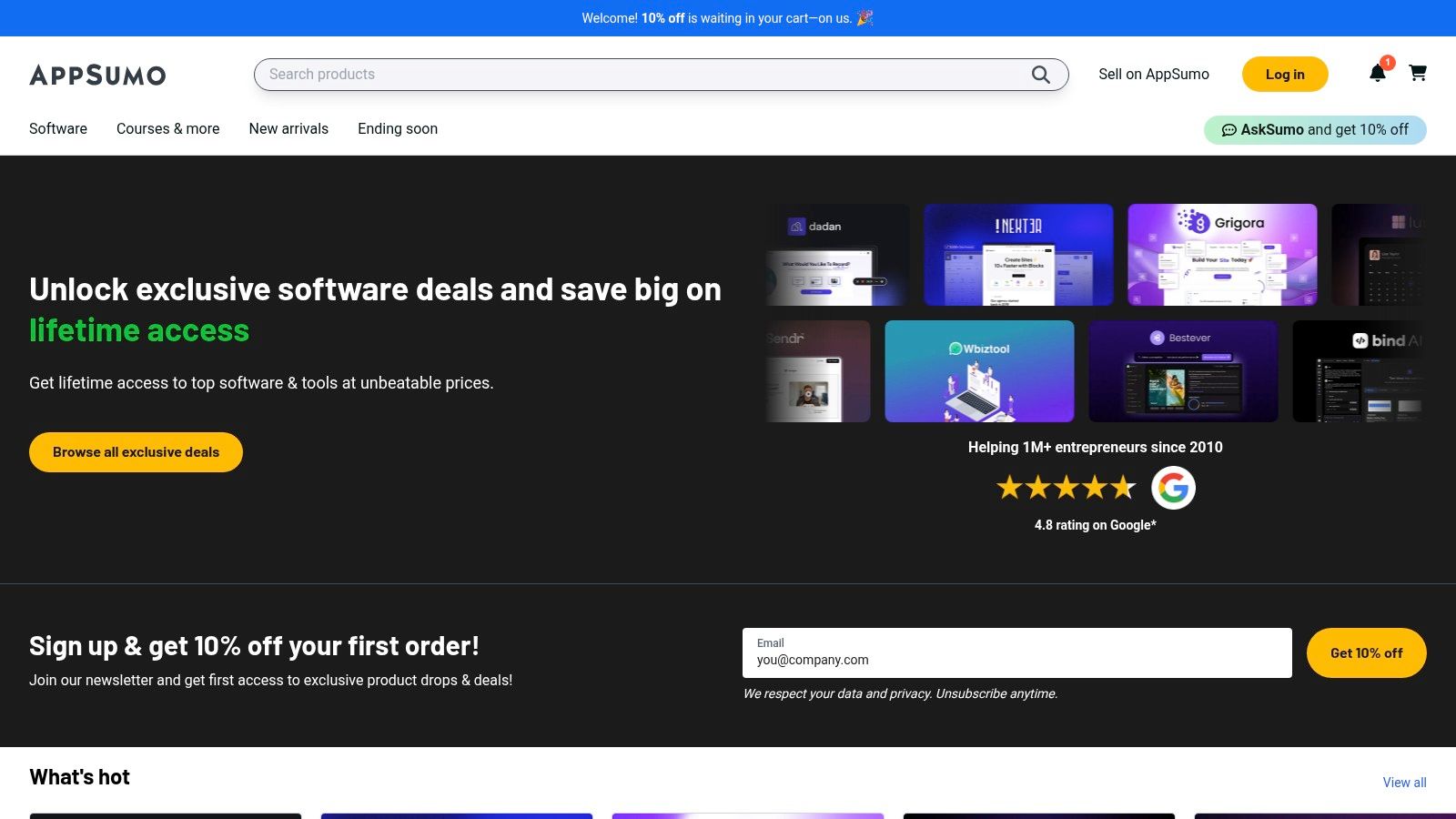
The platform is designed for agility, allowing you to quickly adopt new technologies. Its centralized checkout and license management system simplifies the purchasing process, and many deals come with a generous 60-day money-back guarantee, reducing the risk of trying out a new, unproven tool. This model is ideal for testing different solutions before integrating them into a larger AI Product Development Workflow.
Why It’s a Go-To Resource
AppSumo’s primary advantage is its focus on lifetime deals (LTDs). Paying a one-time fee for lifetime access to a powerful AI tool can drastically reduce your recurring software expenses, freeing up capital for other business areas. This makes it an invaluable resource for bootstrapping startups and small businesses aiming to maximize their ROI on technology investments.
The real value of AppSumo lies in finding hidden gems: up-and-coming AI tools that aren't yet mainstream but offer incredible functionality at a fraction of the cost of established players.
Practical Tips for Using AppSumo
To use AppSumo effectively, always read the user reviews and questions on the deal page. The community is very active and provides honest feedback on a tool’s quality, stability, and the responsiveness of its support team. Pay close attention to the deal terms, as limitations and refund policies can vary. Acting quickly is also key, as the best deals often sell out.
-
Pros: Low-risk experimentation with discounted and lifetime deals. Access to innovative, emerging AI tools before they become widely known.
-
Cons: The quality of new vendors can be inconsistent. Refund windows differ by deal, so terms must be checked carefully.
-
Access: Free to browse; deals are purchased individually.
-
Website: https://appsumo.com
5. Product Hunt
Product Hunt is less of a direct tool and more of a discovery engine, essential for any small business wanting to stay on the cutting edge. It’s a daily leaderboard of the newest tech products, including a massive and ever-growing list of AI solutions. For a business looking for the best AI tools for small business, this platform provides a direct line to what’s new, innovative, and currently capturing the attention of the tech community. It’s the perfect place to spot emerging trends before they become mainstream.
Unlike established marketplaces, Product Hunt’s value comes from its community-driven curation and the direct access it provides to product creators. This dynamic environment allows you to see what’s launching today and engage with the founders directly in the comments section to ask specific questions about functionality or small business use cases.
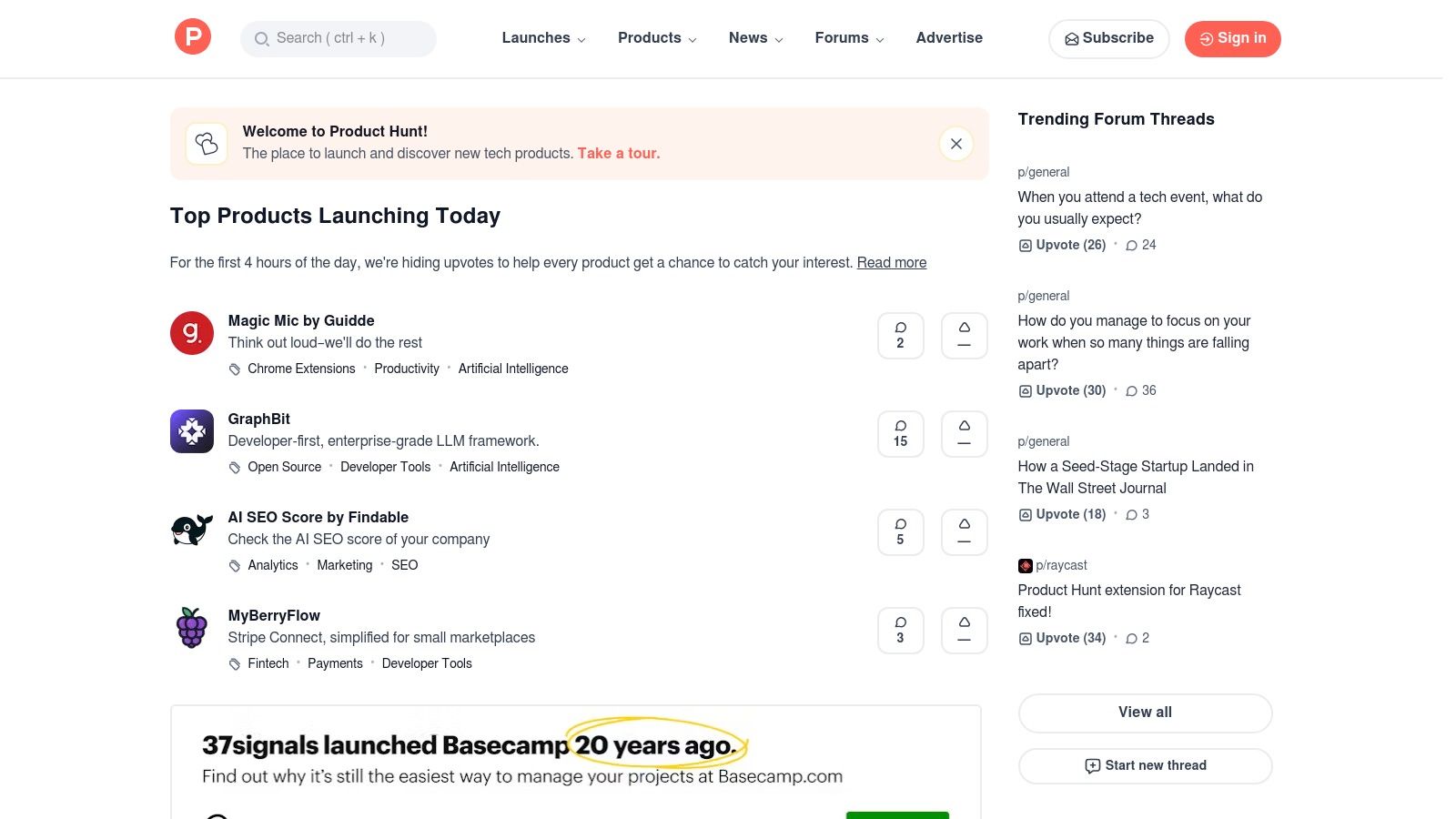
Why It’s a Go-To Resource
Product Hunt excels at surfacing niche and innovative tools that might not appear on larger review sites for months. The platform's daily rankings, based on user upvotes, create a real-time snapshot of what the tech world is excited about. For discovering new and innovative AI tools, small businesses can explore platforms like Product Hunt to find specialized solutions that perfectly match unique operational needs, from hyper-specific marketing automation bots to novel data analysis tools.
The "AI" category on Product Hunt is one of its most active sections. Filtering by this category gives you a curated, daily feed of the latest AI-powered applications, complete with user feedback and founder insights.
Practical Tips for Using Product Hunt
To maximize the platform's value, check the "Today" and "Popular" sections daily or weekly to stay informed. Don’t just look at the upvote count; read the first comment, which is almost always from the maker explaining the product's vision. Pay close attention to the user comments that follow, as they often contain honest first impressions and critical questions that can inform your decision.
-
Pros: Quick discovery of rising AI tools and updates from founders. Community feedback highlighting real-world applications.
-
Cons: Not all quality products achieve visibility. Inconsistent feature exposure across tools.
-
Access: The platform is free to use for browsing and discovering products.
-
Website: https://www.producthunt.com
6. AWS Marketplace (AI/ML)
For small businesses already integrated into the Amazon Web Services ecosystem, the AWS Marketplace is a powerful gateway to deploy sophisticated AI capabilities without building them from scratch. It functions as an enterprise-grade app store specifically for software and machine learning models, making it a prime destination for finding some of the best AI tools for small business that can scale securely. Instead of navigating individual vendor contracts, you can procure and deploy third-party AI solutions with consolidated billing through your existing AWS account.
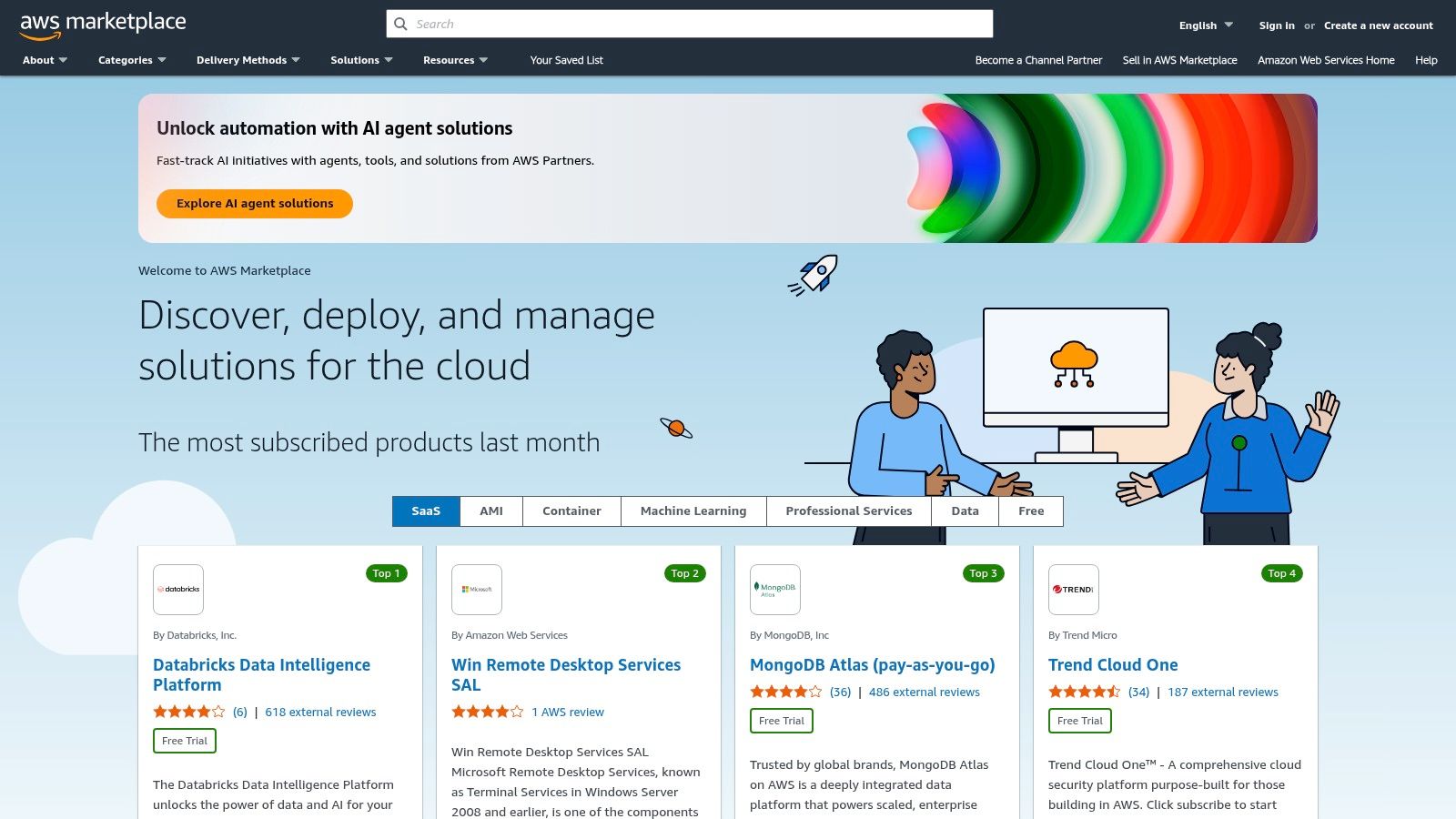
The marketplace offers a vast selection of AI models and software that are ready to integrate with AWS services like SageMaker. This simplifies the technical heavy lifting, allowing businesses to access advanced functionalities like natural language processing, computer vision, and fraud detection on a pay-as-you-go basis.
Why It’s a Go-To Resource
AWS Marketplace's key advantage is its seamless integration and deployment within a secure, familiar environment. You can find pre-trained models that can be deployed with just a few clicks, drastically reducing development time. This allows a small team to leverage enterprise-level AI for specific tasks like data analysis or customer behavior prediction without needing a dedicated machine learning engineering team.
The ability to deploy models directly into a private, VPC-secured environment offers a level of data control and compliance that standalone SaaS tools often cannot match.
Practical Tips for Using AWS Marketplace
To maximize the marketplace, filter solutions by deployment type (e.g., SaaS, SageMaker models) to match your team's technical capabilities. Pay close attention to the usage-based pricing models; while flexible, it's crucial to monitor consumption to avoid unexpected costs. For those new to the platform, starting with well-documented, highly-rated models from established vendors can streamline the implementation process. A clear understanding from an AI requirements analysis is essential before procurement.
-
Pros: Enterprise-grade security and compliance. Rapid deployment into existing AWS infrastructures.
-
Cons: Requires AWS expertise, which can be complex for very small or non-technical teams.
-
Access: Usage-based pricing; requires an AWS account.
-
Website: https://aws.amazon.com/marketplace
7. Microsoft Azure Marketplace (AI + Machine Learning)
For small businesses already integrated into the Microsoft ecosystem, the Azure Marketplace is a powerful, centralized hub for deploying cutting-edge AI. It’s more than just a list of tools; it's a curated catalog of enterprise-grade AI and machine learning solutions that are pre-configured to work with Azure services. This makes it an ideal platform for finding the best AI tools for small business when security, scalability, and integration with existing Microsoft products are top priorities.
The marketplace offers everything from foundational models like Azure OpenAI Service to specialized vector databases like Pinecone and Qdrant. You can filter solutions by type, such as SaaS applications, virtual machine images, or complete solution templates, allowing for rapid deployment without extensive development work.
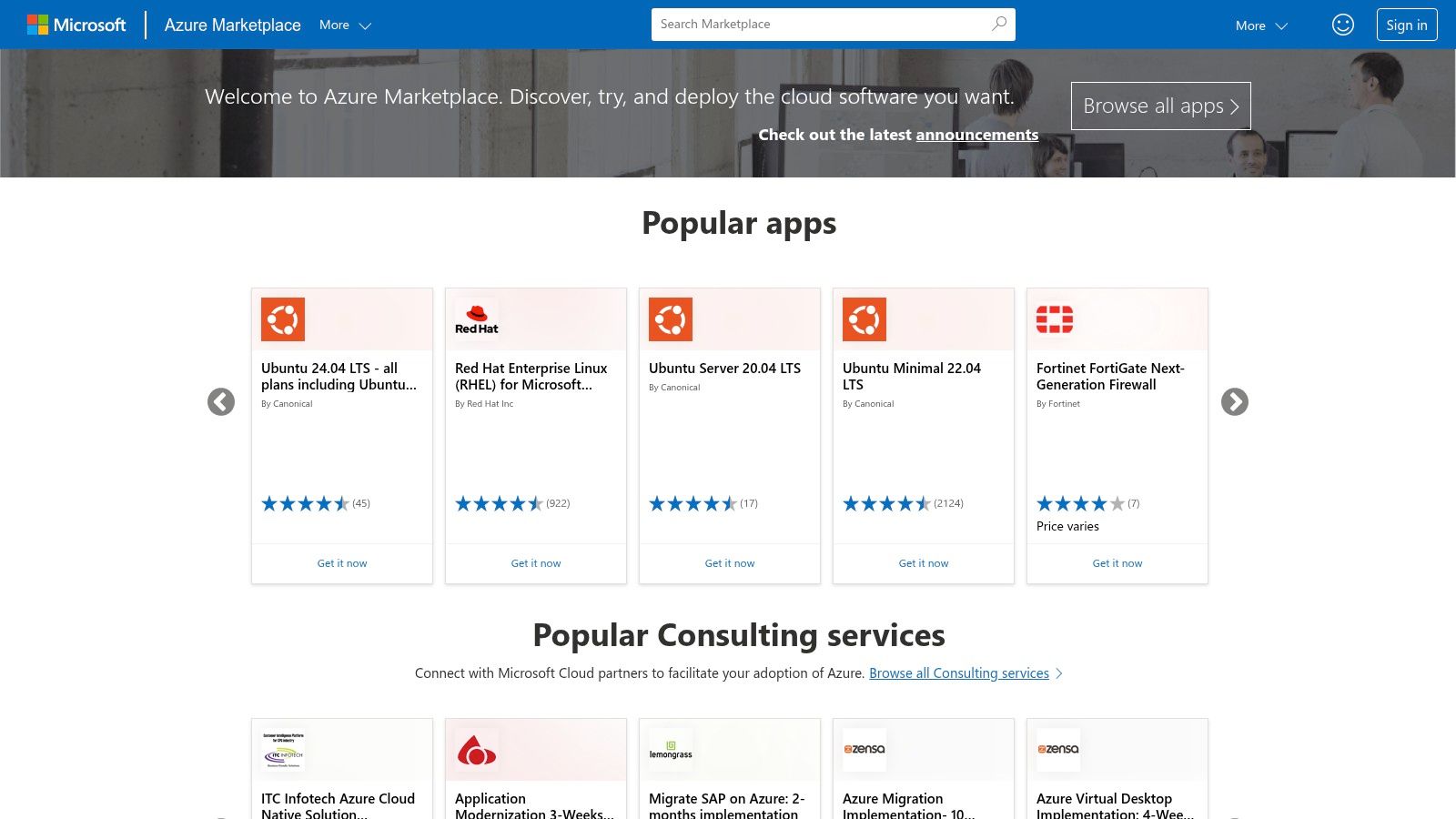
Why It’s a Go-To Resource
The primary advantage of the Azure Marketplace is its deep integration with Azure’s identity, security, and billing frameworks. This unified environment simplifies management significantly, as all your AI tools and subscriptions are managed under a single Azure account. For businesses using Microsoft 365 or Dynamics, the synergy is even greater, enabling seamless data flows and process automation.
The ability to deploy solutions with integrated Azure billing and resource governance removes major administrative hurdles, allowing SMBs to leverage powerful AI without the complexity of managing multiple vendors.
Practical Tips for Using Azure Marketplace
To maximize the marketplace, start by filtering for SaaS-based solutions, which often have lower upfront setup requirements. Utilize the solution templates for common use cases like chatbots or document analysis to accelerate your AI Product Development Workflow. Be aware that while the marketplace is the access point, each solution requires an active Azure subscription, which involves some initial administrative overhead.
-
Pros: Deep integration with Microsoft identity and security frameworks. Wide selection across chatbot, automation, and MLOps tools.
-
Cons: Requires an Azure subscription with administrative setup overhead. Can be overwhelming for businesses not already using Azure.
-
Access: An active Microsoft Azure subscription is required to deploy and use marketplace solutions.
8. Google Cloud Marketplace (AI & new AI Agent Marketplace)
For small businesses already invested in the Google ecosystem, the Google Cloud Marketplace is a powerful gateway to deploy enterprise-grade AI. It functions less as a single tool and more as a curated app store, offering a vast array of AI solutions from both Google and third-party vendors. This makes it an essential platform for finding the best AI tools for small business, especially for companies that use services like BigQuery and Google Cloud Platform (GCP).
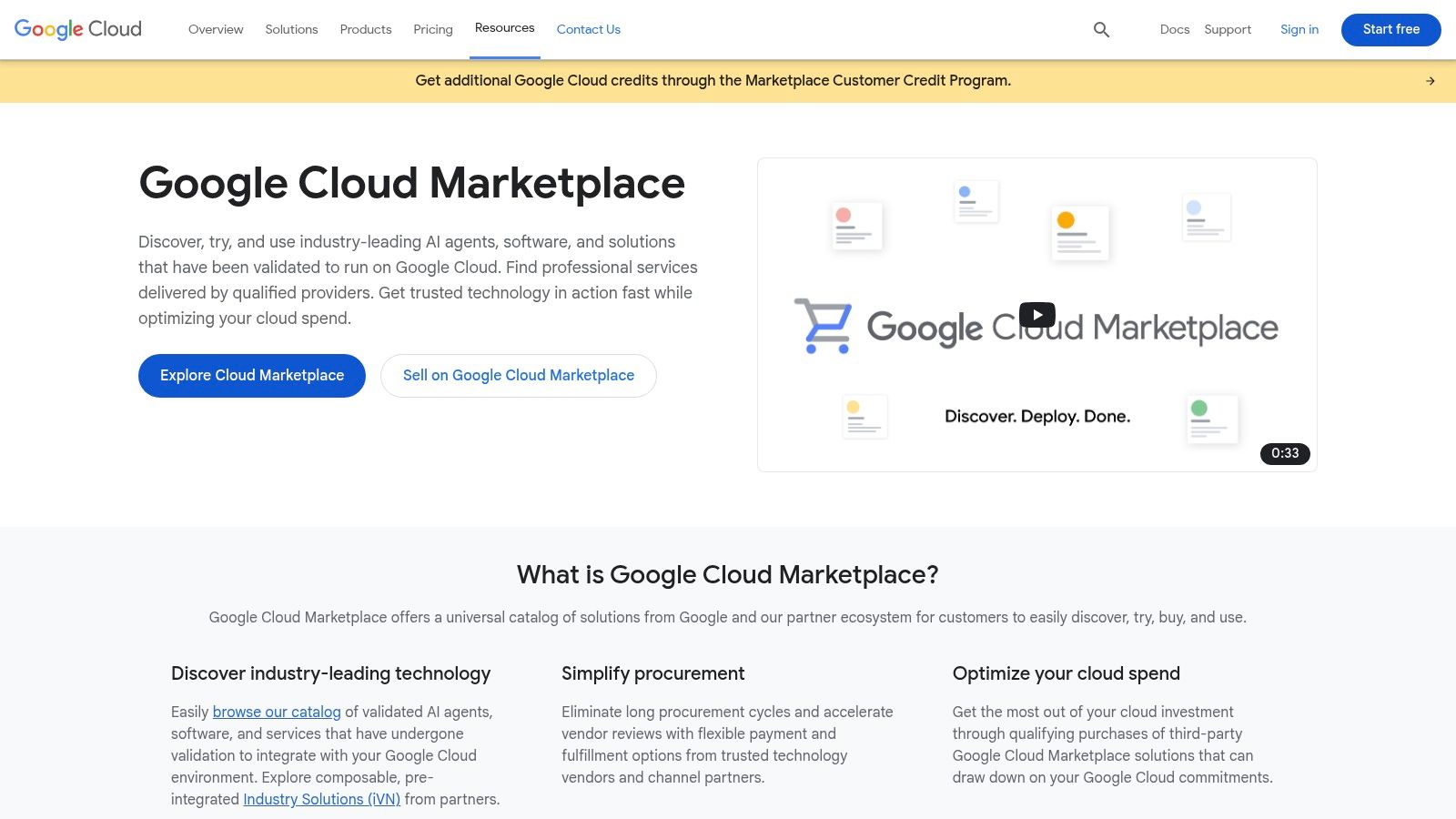
The marketplace simplifies the otherwise complex process of procuring and deploying AI models. With features like one-click deployment for numerous solutions and direct integration with Vertex AI, businesses can quickly implement everything from commerce recommendation engines to sophisticated search functionalities.
Why It’s a Go-To Resource
The primary advantage of the Google Cloud Marketplace is its seamless integration and consolidated billing within the GCP environment. If your business operations already run on Google Cloud, you can add powerful AI capabilities without the headache of managing separate vendors and invoices. The introduction of the AI Agent Marketplace further enhances this, providing pre-built agents that can be deployed for specific business tasks.
The platform's direct access to deployable AI solutions on Vertex AI allows even small teams to leverage sophisticated, scalable machine learning models without needing deep in-house expertise.
Practical Tips for Using Google Cloud Marketplace
To maximize the marketplace, start by filtering for solutions that directly integrate with the Google services you already use, such as BigQuery or Google Workspace. Pay close attention to the pricing models, as they can range from pay-as-you-go to fixed monthly subscriptions. Before committing, use the documentation and tutorials provided for each listing, as some tools may require a more technical setup. This due diligence is a critical part of any effective AI requirements analysis.
-
Pros: Ideal for SMBs leveraging Google Cloud and BigQuery. Simplifies procurement and billing processes.
-
Cons: Potential for cloud provider lock-in. Some listings have a strong technical focus, requiring development resources.
-
Access: Pricing varies by solution; some are free, while most are subscription-based or pay-per-use.
-
Website: https://cloud.google.com/marketplace
9. Shopify App Store (AI for eCommerce SMBs)
For small businesses in the eCommerce space, the Shopify App Store is less of a single tool and more of a dedicated ecosystem for finding powerful, commerce-focused AI solutions. It acts as a specialized marketplace where merchants can discover and integrate thousands of AI-powered applications directly into their online stores. This platform is an essential resource for finding the best AI tools for small business operations, from automated product descriptions and professional image generation to predictive analytics for customer behavior.
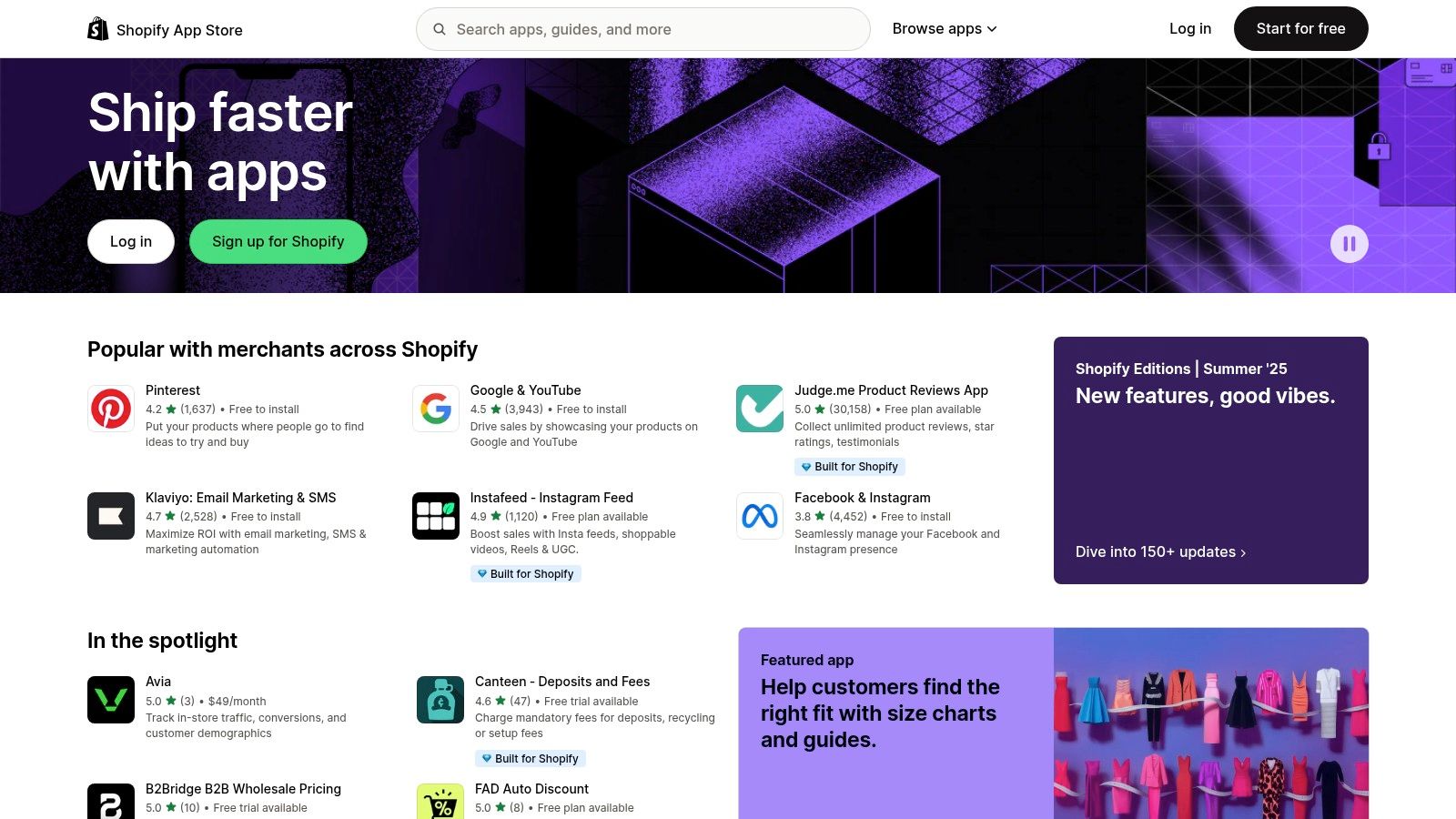
The primary advantage is its seamless integration. Instead of patching together third-party tools, Shopify merchants can add AI functionalities for SEO, content creation, merchandising, and even customer service with one-click installations. Billing is consolidated through the existing Shopify admin panel, simplifying subscription management significantly.
Why It’s a Go-To Resource
The Shopify App Store's strength lies in its vast, commerce-centric selection. You can find niche AI tools designed to solve specific eCommerce challenges, like generating high-converting ad copy or creating personalized product recommendations that boost average order value. The platform also features native solutions like Shopify Magic, an AI Store Builder that can generate store layouts, text, and images from simple keywords.
By leveraging apps built specifically for the Shopify platform, merchants can ensure greater stability and compatibility, avoiding the technical hurdles that often come with external integrations.
Practical Tips for Using the Shopify App Store
To maximize its value, use specific keywords like "AI product photos" or "AI chatbot" in your search. Always check recent reviews, paying close attention to feedback from merchants with similar-sized stores or product catalogs. Before installing, review the app's permissions and data access requirements to ensure they align with your privacy policies. Proper app selection is a critical step in building a successful online store, much like performing an AI requirements analysis is for a technology project.
-
Pros: Wide selection of AI apps tailored for commerce outcomes. Seamless billing and installation inside the Shopify ecosystem.
-
Cons: Frequent UX and store design changes may complicate app discovery and filtering. Quality can vary widely between apps.
-
Access: The App Store is free to browse; individual apps have their own pricing (free, subscription, or usage-based).
-
Website: https://apps.shopify.com
10. Microsoft 365 with Copilot
For small businesses already embedded in the Microsoft ecosystem, Copilot is less a new tool to adopt and more a powerful upgrade to the applications they use daily. It integrates AI directly into Word, Excel, PowerPoint, Outlook, and Teams, turning familiar software into one of the best AI tools for small business productivity. Instead of context-switching between apps, your team can summarize long email threads, generate presentation drafts, or analyze spreadsheet data using simple, natural language prompts.
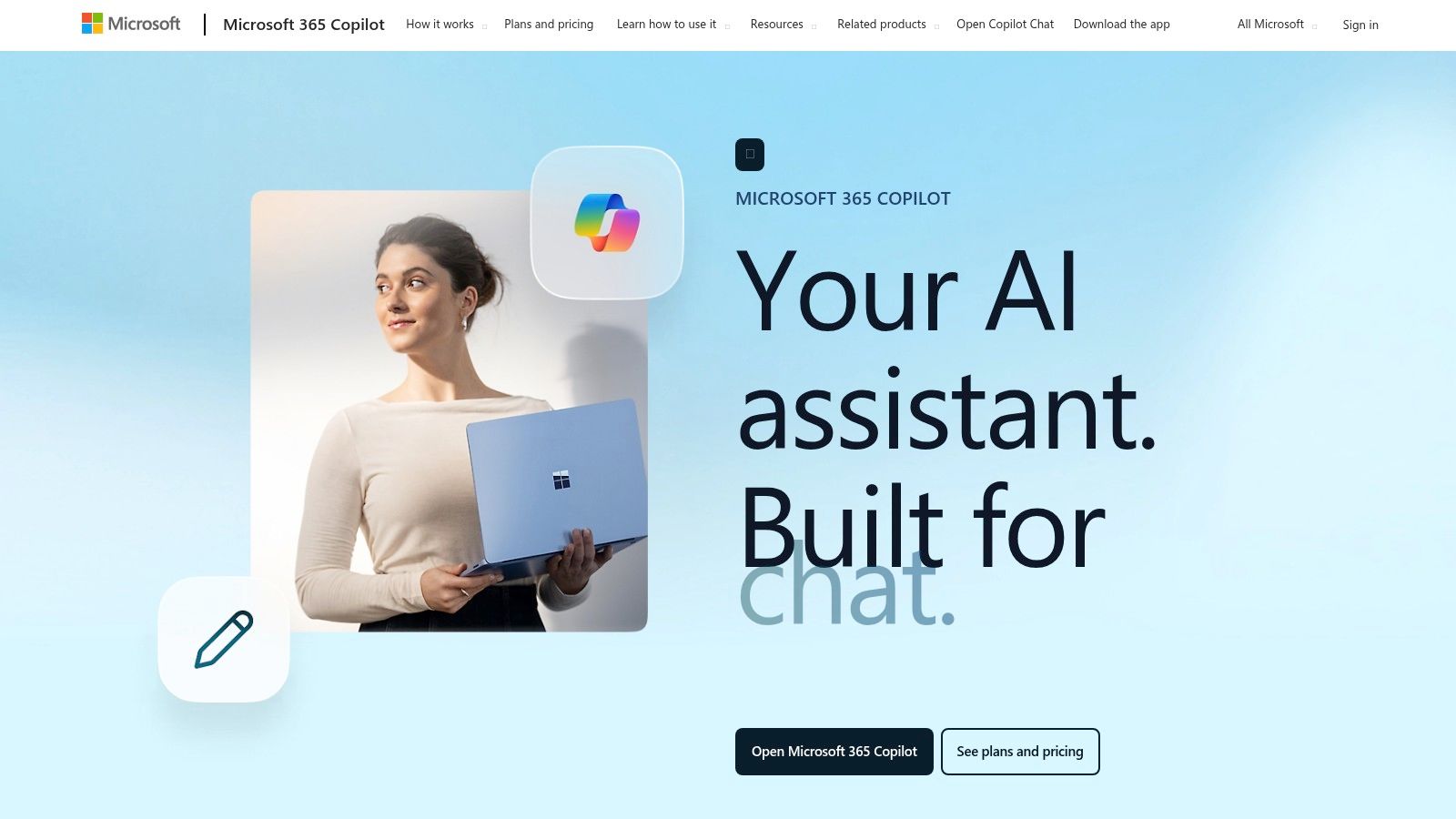
The platform is built on enterprise-grade security, ensuring that your sensitive business data remains protected within your Microsoft 365 tenant. This is a significant advantage over many third-party tools, as it simplifies compliance and data governance without requiring complex new security protocols.
Why It’s a Go-To Resource
Copilot’s primary strength is its native integration, which minimizes the learning curve and change management friction. It enhances existing workflows rather than replacing them. For instance, it can generate meeting summaries and action items directly within Teams, or help draft a client proposal in Word based on notes from a separate document. This seamless experience accelerates tasks that would otherwise consume hours of manual effort.
Copilot's ability to reason over your entire business data estate (emails, files, chats) provides contextual answers and insights that standalone AI tools simply cannot access.
Practical Tips for Using Microsoft 365 with Copilot
To maximize ROI, focus on user adoption and providing clear use cases. Train your team to think of Copilot as an assistant for drafting, summarizing, and data analysis. Start with a pilot group to identify the most impactful applications before rolling it out company-wide. Remember that the quality of Copilot's output depends heavily on the quality and organization of your underlying data within Microsoft 365.
-
Pros: Minimal change management for existing Microsoft users. Enterprise-grade data protection and clear per-user pricing.
-
Cons: Requires qualifying Microsoft 365 plans. Return on investment depends on user adoption and data quality.
-
Access: Available as a paid add-on for most Microsoft 365 Business and Enterprise plans.
11. Google Workspace (Gemini features included in Business/Enterprise plans)
For small businesses already embedded in the Google ecosystem, Google Workspace now represents one of the most seamless ways to integrate AI into daily operations. Instead of purchasing separate AI add-ons, Gemini AI features are being bundled directly into Business and Enterprise plans. This makes it one of the best AI tools for small business by transforming familiar applications like Gmail, Docs, and Sheets into powerful, AI-assisted productivity hubs.
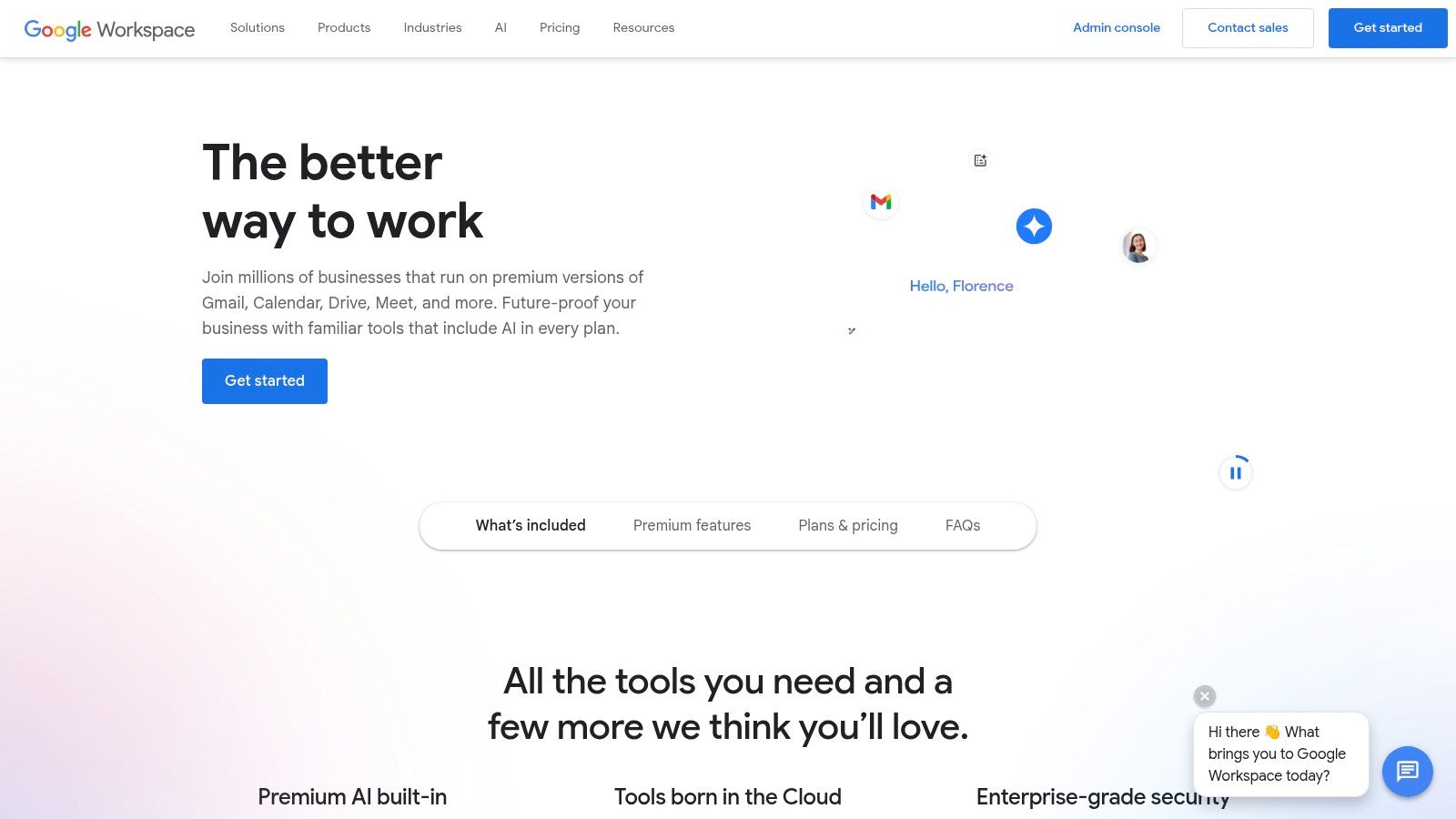
The integration allows teams to draft emails, generate content in Docs, create formulas in Sheets, and summarize meetings in Meet, all within the platforms they use every day. This approach minimizes the learning curve and eliminates the friction of switching between different applications, boosting immediate productivity. For businesses concerned with data security, Google Workspace maintains compliance with standards like SOC, ISO, and HIPAA.
Why It’s a Go-To Resource
The primary strength of Google Workspace with Gemini is its native integration. There is no need for complex API connections or third-party tools to bring AI to your core productivity suite. This unified environment ensures that your team can leverage AI assistance without disrupting their existing AI Product Development Workflow, making adoption smooth and cost-effective.
Gemini’s capabilities are context-aware, meaning it can pull information from your emails, documents, and calendar to provide more relevant and useful assistance, saving significant time on administrative tasks.
Practical Tips for Using Google Workspace with Gemini
To maximize the benefits, encourage your team to experiment with Gemini prompts across different apps. For instance, use "Help me write" in Gmail to draft customer follow-ups or use the "Help me organize" feature in Sheets to analyze sales data. Since pricing and feature availability have been updated, it’s crucial to review the latest plan details to ensure the specific Gemini features you need are included in your subscription tier.
-
Pros: AI capabilities are included within existing Workspace plans. A strong fit for organizations already using the Google ecosystem.
-
Cons: Plan pricing and included features are subject to recent changes; users must confirm current details.
-
Access: Gemini features are available in specific Google Workspace Business and Enterprise plans.
-
Website: https://workspace.google.com
12. Zapier
Zapier has long been the gold standard for no-code automation, but its recent expansion into AI has transformed it into an essential platform for any small business. It now enables you to build powerful, AI-driven workflows that connect thousands of applications without writing a single line of code. This makes it one of the best AI tools for small business looking to automate complex processes, from lead qualification to customer support responses.
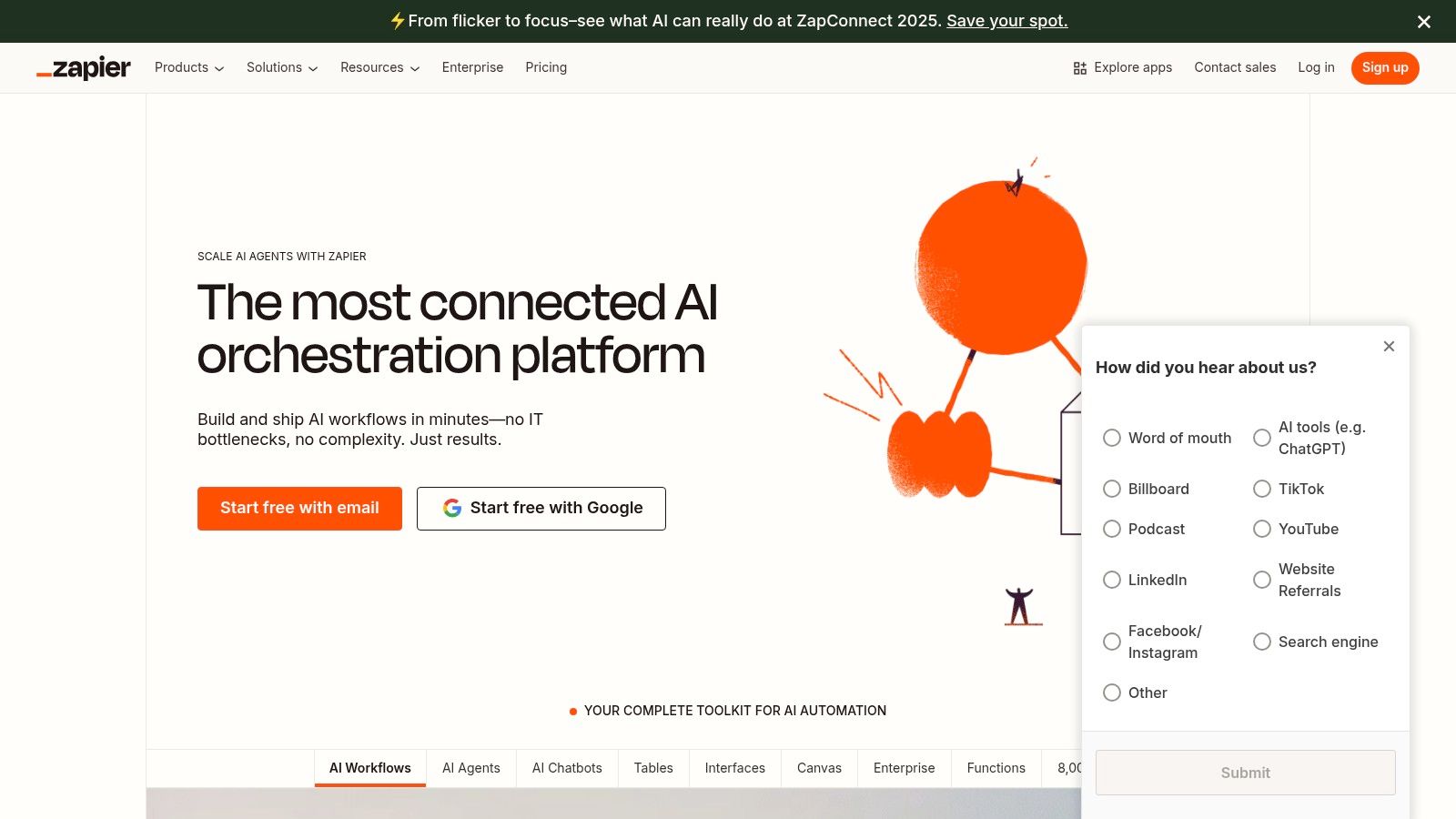
The platform’s visual builder allows you to connect triggers (like a new email) with actions (like summarizing it with AI and adding it to a CRM). With new features like AI Agents, Zapier can now handle more dynamic, multi-step tasks, effectively acting as an automated team member that can reason and execute jobs across your software stack.
Why It’s a Go-To Resource
Zapier’s core strength is its unparalleled library of over 6,000 app integrations combined with an accessible entry point into AI. For a small business, this means you can start with simple two-step automations and gradually build up to sophisticated AI-powered systems as your needs evolve. You can create a custom chatbot for your website or an AI agent to manage your inbox, all within the same familiar interface.
Zapier’s AI features are not just add-ons; they are deeply integrated, allowing you to infuse intelligence into the business processes you already have in place, turning standard automation into smart automation.
Practical Tips for Using Zapier
Start by identifying a repetitive, high-volume task in your daily operations, such as manually entering data from forms into a spreadsheet. Automate this first to understand the platform's logic. From there, explore the "AI power-ups" to add layers of intelligence, like using AI to categorize incoming support tickets before they are assigned. Explore how to integrate this tool with an AI Automation as a Service model for maximum efficiency.
-
Pros: Massive library of app integrations. User-friendly for non-technical teams and scales from simple to complex AI workflows.
-
Cons: Task limits on plans can lead to unexpected costs if not monitored. Very complex automations can become difficult to manage without oversight.
-
Access: A free tier is available. Paid plans offer more tasks and advanced features, with AI add-ons starting from $20-$50 per month.
-
Website: https://zapier.com
Top 12 AI Tools for Small Business: Feature & Pricing Comparison
| Platform | Core Features & Capabilities | User Experience & Quality Metrics | Value Proposition | Target Audience | Price Points / Access |
|---|---|---|---|---|---|
| Ekipa AI | Tailored AI strategies in 24h; end-to-end AI co-creation | Backed by 20+ years agile expertise; personalized workshops | Fast, affordable AI transformation without costly consultants | Mid-sized enterprises, AI strategists | Custom pricing; free industry reports |
| G2 | Verified user reviews; side-by-side tool comparisons | Extensive real-user feedback; updated rankings | Quick AI tool shortlisting across categories | Small businesses, buyers | Free to use |
| Capterra | Filters by size, pricing, features; human-moderated reviews | Ease of navigation; authentic reviews | Filtered AI software discovery for SMBs | Small businesses | Free to use |
| AppSumo | Discounted & lifetime SaaS deals; refund policy | Refund available on many deals; centralized checkout | Low-risk AI tool experimentation | Budget-conscious SMBs | Varies per deal; often lifetime access |
| Product Hunt | Daily launches; AI tool rankings; community reviews | Community feedback; founder updates | Early discovery of innovative AI products | Early adopters, SMBs | Free to use |
| AWS Marketplace (AI/ML) | SageMaker-ready AI models; diverse AI categories | Enterprise-grade security; integrated billing | Ready AI deployment in AWS infrastructure | AWS users, enterprises | Usage-based pricing |
| Microsoft Azure Marketplace | Generative AI, chatbots, MLOps; Azure integration | Deep security integration; broad AI tools | AI solutions within Microsoft ecosystem | SMBs, Microsoft customers | Pay-as-you-go; subscription-based |
| Google Cloud Marketplace | One-click AI deployments; Vertex AI integration | Simplified billing; partner revenue share | AI solutions for Google Cloud users | Data-driven SMBs | Usage-based pricing |
| Shopify App Store | 10,000+ AI apps; AI Store Builder | Seamless Shopify integration; UX can vary | AI apps to boost ecommerce performance | Shopify SMB merchants | Varies by app |
| Microsoft 365 with Copilot | AI in Office apps; agent creation; admin controls | Enterprise data protection; clear pricing | AI embedded in familiar productivity tools | Microsoft 365 SMB & enterprise | Per-user pricing; plan required |
| Google Workspace (Gemini) | AI across Docs, Gmail, Sheets; compliance certified | Included in Workspace plans; updated pricing | AI features integrated with Google productivity | Google Workspace users | Included in Workspace subscription |
| Zapier | AI Agents, chatbots; no-code workflow builder | User-friendly; scalable plans | Automate AI workflows across 5,000+ apps | SMBs, non-technical teams | Free tier; add-ons start at $20/mo |
From Tools to Transformation: Building Your AI-Powered Future
We've explored a comprehensive landscape of platforms and tools, from expansive marketplaces like AWS and Google Cloud to integrated ecosystem players like Microsoft 365 Copilot and Zapier. The journey through this curated list of the best AI tools for small business reveals a powerful truth: artificial intelligence is no longer a futuristic concept reserved for tech giants. It's an accessible, scalable, and indispensable asset for driving growth, efficiency, and innovation in companies of any size.
The core takeaway is that the "best" tool is not a one-size-fits-all solution. Your ideal AI stack depends entirely on your unique business context, existing technology infrastructure, and strategic goals. For an e-commerce brand, the Shopify App Store is a goldmine for AI-powered marketing and personalization. For a service-based business, Google Workspace with Gemini might be the key to unlocking team productivity and automating administrative tasks.
Key Takeaways for Your AI Journey
As you move from evaluation to implementation, keep these critical principles in mind:
-
Start with the Problem, Not the Tool: Don't chase the latest shiny AI object. Instead, identify a specific, high-impact business problem. Is it lead qualification? Customer support response times? Content creation bottlenecks? A clear problem statement is the foundation of a successful AI implementation. Our guide on AI requirements analysis can help you articulate these needs effectively.
-
Prioritize Integration: The most powerful tools are those that seamlessly connect with your existing workflows. Platforms like Zapier and the integrated AI features within Microsoft 365 and Google Workspace are prime examples. A tool that operates in a silo creates more work than it saves.
-
Embrace an Experimental Mindset: The AI landscape is evolving at an unprecedented pace. Be prepared to test, learn, and iterate. Start with a small pilot project, measure its impact, and scale what works. This agile approach minimizes risk and maximizes learning, a concept we detail in our AI Product Development Workflow.
Your Actionable Next Steps
Feeling overwhelmed by the options is natural. The key is to take deliberate, informed steps forward. Here’s a simple framework to guide your next move:
-
Audit Your Current Processes: Identify the top three most time-consuming or inefficient tasks in your daily operations. This is your starting point for identifying high-value automation opportunities.
-
Match Tools to Needs: Revisit the categories in this article. Does your biggest challenge lie in marketing, customer service, or operational analytics? Use that to narrow your focus to 2-3 potential tools for a deeper evaluation. For more hands-on guidance, exploring a Custom AI Strategy report can provide a personalized roadmap.
-
Plan for Adoption: Implementing a tool is only half the battle. You need a plan to train your team, adapt workflows, and monitor performance. As you integrate AI into content creation, consider exploring resources that help you refine AI-generated drafts, such as these free AI tools to humanize AI-generated text, to maintain your brand voice.
Ultimately, adopting AI is more than a technological upgrade; it's a strategic business transformation. It's about empowering your team to focus on high-value, creative work while intelligent systems handle the repetitive and data-intensive tasks. By choosing the right tools and building a thoughtful implementation plan, you are not just buying software; you are investing in a more intelligent, resilient, and competitive future for your business. For further inspiration, browse the real-world use cases that show what's possible.
Ready to move beyond lists and build a truly integrated AI strategy? Ekipa AI specializes in helping businesses like yours navigate this complex landscape, from strategy to implementation. Let our expert team help you build a custom AI roadmap that drives real business results.



